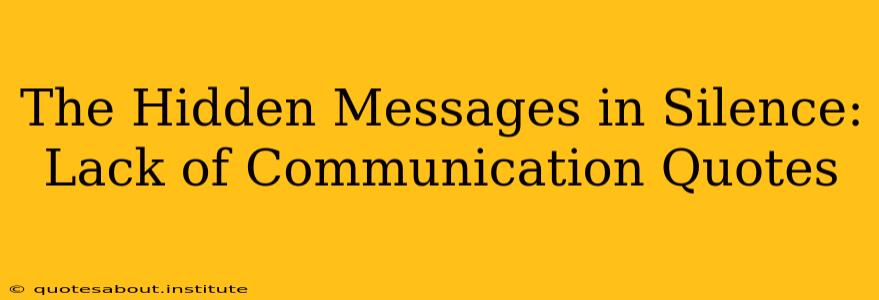The Hidden Messages in Silence: Lack of Communication Quotes and Their Deeper Meanings
Silence. It can speak volumes, sometimes more eloquently than words ever could. While often perceived as a void, silence in communication can carry a multitude of hidden meanings, often negative and detrimental to relationships. This article delves into the powerful impact of unspoken words, exploring the significance of silence and offering insights into the various interpretations of a lack of communication. We'll examine poignant lack of communication quotes and analyze the underlying messages they convey.
Why is Communication Silence So Powerful?
Silence in communication isn't merely the absence of words; it's an active choice with potential consequences. It can breed misunderstanding, fuel resentment, and ultimately damage relationships. The reasons behind silent treatment can range from passive aggression to genuine inability to express feelings. Understanding the nuances of silence is crucial for healthy communication and conflict resolution.
Exploring Lack of Communication Quotes and Their Implications:
Several insightful quotes capture the essence of the silent treatment and its destructive nature. Let's explore some of them:
-
"The most basic of all human needs is the need to understand and be understood." - Ralph Nichols This quote highlights the fundamental human desire for connection and communication. Silence, in this context, represents a failure to meet this basic need, leaving individuals feeling isolated and unheard.
-
"Sometimes the most powerful thing you can say is nothing at all." - Unknown While this quote might seem to contradict the overall theme, it emphasizes the importance of timing and context. Silence can indeed be powerful, but it's often the absence of needed communication that's detrimental. The power lies not in withholding information, but in choosing the right moment to speak.
-
"Words are very unnecessary when you have a true connection with someone. You just feel it." - Unknown This seemingly optimistic quote, however, highlights a critical issue. While some nonverbal cues indicate connection, the absence of verbal communication can leave a void in understanding, especially when dealing with complex issues or disagreements. Feelings alone are insufficient for healthy, lasting relationships.
Frequently Asked Questions about Silence and Communication:
Here, we address some commonly asked questions about the significance of silence in communication:
1. What does it mean when someone goes silent during a conversation?
Silence during a conversation can have several meanings. It might indicate disagreement, hurt feelings, a need for time to process information, or even passive aggression. The context of the conversation and the individuals involved are key to deciphering its meaning. It's important to try and understand the underlying cause rather than assuming negativity.
2. How can I tell if someone is avoiding me through silence?
Avoidance through silence often manifests in a pattern of unresponsiveness, missed calls, delayed texts, or abrupt changes in communication style. If these behaviors are consistent and unexplained, it's a significant sign that the person may be intentionally avoiding communication.
3. Is silence always a bad thing in communication?
Not necessarily. Silence can be a tool for reflection, contemplation, or even to let emotions settle before engaging in a discussion. However, prolonged or unexplained silence, particularly in the context of a conflict or sensitive issue, usually signifies a problem.
4. How can I address silence as a communication barrier?
Open and honest communication is crucial. Initiate a conversation, express your concern about the silence, and try to understand the underlying reasons. Active listening, empathy, and a willingness to compromise are crucial for overcoming communication barriers stemming from silence.
5. What are the long-term effects of a lack of communication?
Prolonged lack of communication can lead to resentment, isolation, misunderstandings, and ultimately damage or even sever relationships. It can also contribute to anxiety and stress for the individuals involved.
Conclusion:
The impact of silence in communication is multifaceted and far-reaching. While silence can sometimes be a necessary pause, prolonged or unexplained silence often signals deeper issues within a relationship. Understanding the nuances of silence and addressing the root causes of communication breakdowns is vital for maintaining healthy, fulfilling interactions. Remember, effective communication is a two-way street, and requires both parties to be active participants.

